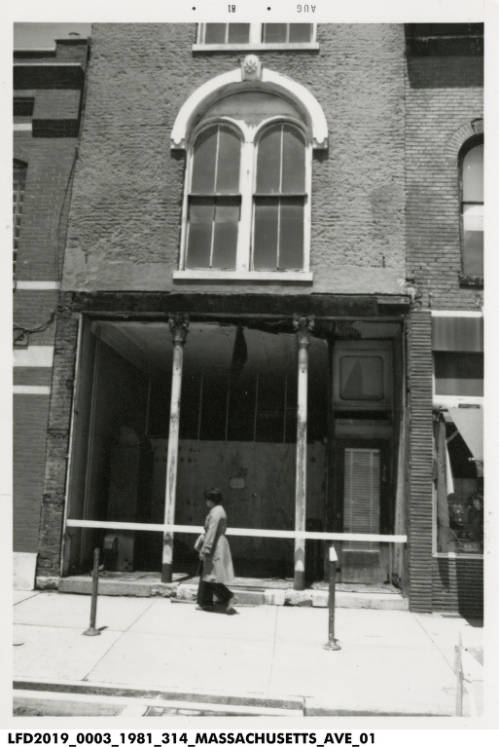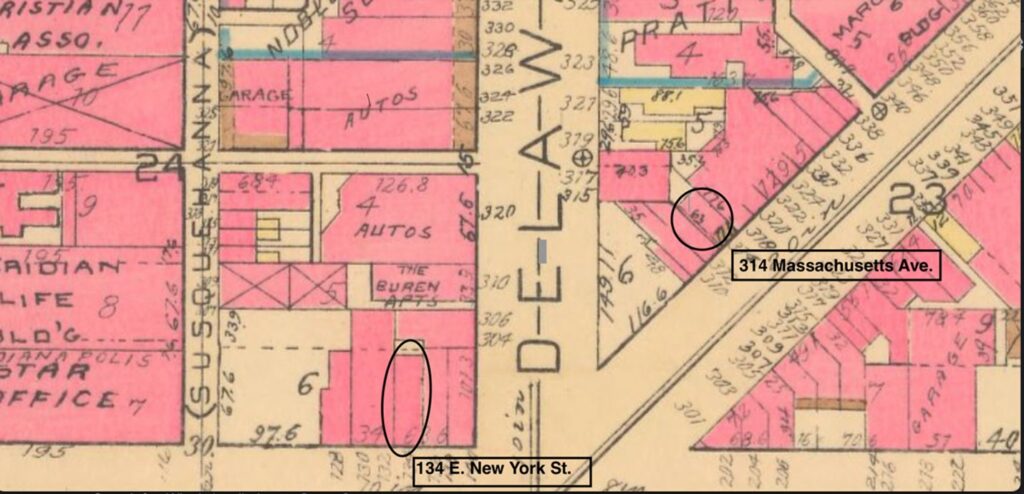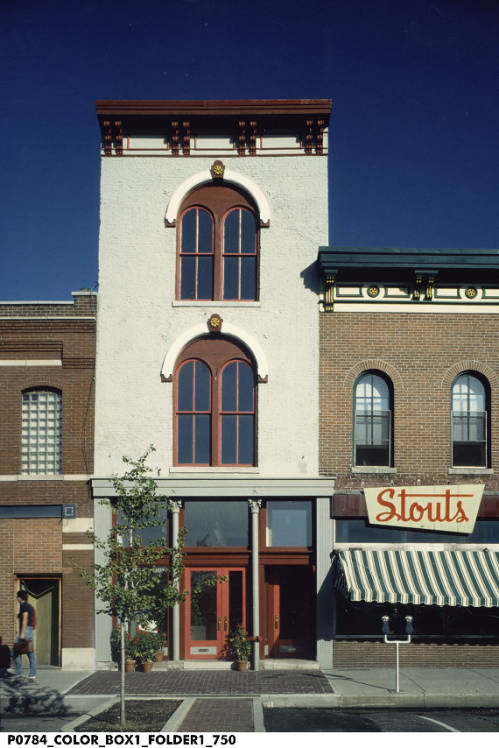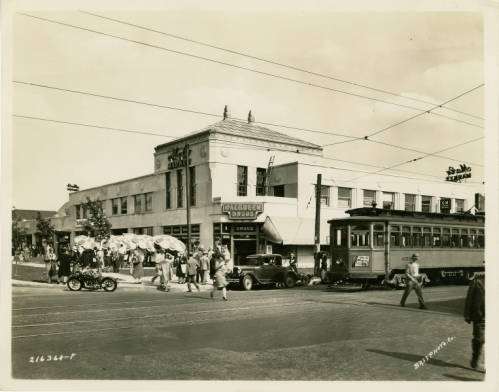
Purchase Tickets
History Hidden in Plain Sight: The Chinese Club on Massachusetts Avenue
May 22, 2023

A lot of Asian history in Indiana is often hidden in plain sight. There were several Asian businesses on Monument Circle beginning in the late 1800s, examples can be found here and here. However, there are many parts of Indianapolis that have been touched by the Asian community that are now long gone due to redevelopment or otherwise. This blog explores several locations and their integral influence on early Chinese history in the City of Indianapolis. When people think that the Asian community is new and lacking history, they may need to reconsider that thought.
What first prompted my interest in this subject was the Chinese Club located at 314 Massachusetts Avenue, now the restaurant The Burnside Inn (est. 2017). This narrow, three-story building once housed a discrete social Chinese club known as, Chinese Club.
This Chinese Club, a private social club, first appeared in the Indianapolis city directory on Massachusetts Avenue (Mass Ave) beginning in 1960. However, just half a block away there was another Chinese Club existing at 134 E. New York Street from 1952-1958. What happened in-between 1958 and 1960? A possible clue for the missing years was when 19 Chinese men were arrested on the evening of June 5, 1958, when this club was raided on suspicion of illegal gambling. The Indianapolis News reported that “nineteen persons, all of Chinese ancestry, were charged with visiting a dive” and confiscated playing cards, $40 in cash (today, $418), and “Chinese gaming equipment… metal cup containing wooden blocks and a sheet of metal with Chinese characters written on it.” The men had their bonds set at $250 each (today, $2,615). In 1960, this club reappeared in the city directory at 314 Massachusetts Ave. My two questions are: were they the same Chinese club and did this raid prompt its relocation? We will never know (but if you do…drop me a line.)

Chinese Club locations, 134 E. New York Street and 314 Massachusetts Avenue
Indianapolis Baist Atlas Plan # 5, 1941, Indianapolis Sanborn Map and Baist Atlas Collection, Indiana State Library (digitized by IUPUI University Library).
Mentions of the club in the 1960s at the Massachusetts Avenue location were due to an unfortunate discovery in 1968. Sing Dott Jung, the former owner of the Lantern Room Restaurant (3768 N. Meridian St.) was permanently residing at the club and was discovered after passing away from natural causes.
In the 1970s, Harry Jean (Jin, Yan, or Zhen) was its last known proprietor. Harry (like Sing Dott Jung) was a WWII Army Veteran and regularly kept up with the news by reading an array of Chinese language newspapers. Harry was asked by an Indianapolis Star newspaper reporter in 1972 about President Nixon’s forthcoming visit to China and with the CCP Chairman Mao Zedong. At this time China was slowly emerging from a period of diplomatic isolation and the visit resumed congenial relations between the two countries. Interest in international relations between the two countries caused local reporters to seek the opinion of a local authority. Given its secretive outward appearance, longevity in the city, and connection to “the old country”, the Chinese Club was the local go-to place to solicit opinions regarding China throughout the 1970s. The club was no longer listed in the city directory past 1978. The tenants left this location and presumably disbanded. Soon after, the building was renovated.

314 Massachusetts Avenue, August 1981 (Pre renovation)
City of Indianapolis, Department of Metropolitan Development Collection, IHS

(314 Massachusetts Avenue) Stouts Gray Building, 1983 (Post renovation)
Indianapolis Bicentennial Collection, IHS
Old World v. New World Ideals
In 1981, an Indianapolis News article titled, “Achievement and Discrimination Mark Chinese-American Tradition,” spoke of the history of the Chinese American experience in Indianapolis and its generational changes. Mandarin Inn restaurant owner, Paul Cheung was the featured interviewee. Up until this 1981 article, second and third-generation Chinese Americans of Indianapolis began to seek new opportunities that were outside of the family-run business. One opportunity was going to college and entering new fields of employment. While few did return home and help with the family business, anything resembling old-world Chinese Indianapolis was slowly being phased out. Paul notably lamented in this article the growing divide between old-world ideals and the acculturation of the present generation. This divide contributed to the slow decline of many early Indianapolis Chinese-owned businesses and restaurants.
Paul Cheung and his brother Henry were second-generation proprietors of the Mandarin Inn Restaurant at 3775 College Avenue in Indianapolis. At the time, Paul estimated that there were 28 Chinese restaurants in Indianapolis and 25 of those proprietors got their start at the Mandarin Inn. Paul recalled from his youth a noticeable “geographically defined Chinese community” along Massachusetts and Fort Wayne avenues that were “anchored by hand laundries, restaurants, and discreet social clubs where men played mah-jongg and tan fan games.” He was referring to the Chinese Club on Massachusetts Avenue and the 5 Chinese-owned laundries split between Ft. Wayne and Massachusetts Avenues. At their height, there were about 40 Chinese laundry locations across Indianapolis in 1927.

Ma Co Market, Walgreens (Bass #216346-F), 1930
W.H. Bass Photo Company Collection, IHS
The Cheung brother’s uncle, Harry K. Jung was an early fixture in Indianapolis and was once the long-time president of the Bamboo Inn Restaurant (1918-1961) in the 1930s. Harry K. Jung stepped down as president of the Bamboo Inn in 1939 and established his own restaurant in 1940. His restaurant, the Mandarin Inn held its grand opening on July 6, 1940. Harry K. ran the Mandarin Inn until early 1958. His brother Edward and their nephews; Paul, Wai-Mon, and Henry took ownership of the restaurant on June 11, 1958. Edward retired in 1963 (passing in 1967), Wai Mon passed in 1978, Paul and Henry retired from the restaurant business in 1982. With their retirement, came with new owners of the Mandarin Inn, M.C., and A.C. Wong. The restaurant closed sometime during the mid-late 1980s. In 1992 two of the very last vestiges of early Chinese and Asian history in Indianapolis succumbed to the past, with the passing of Paul Cheung and the demolition of Ma Co Market building, home to the Mandarin Inn. Both events poignantly marked the end of an era.








